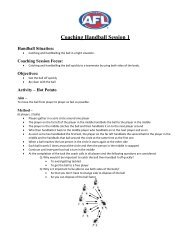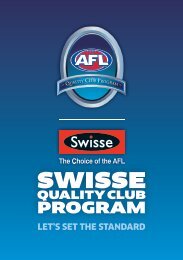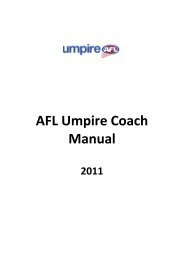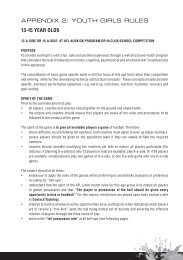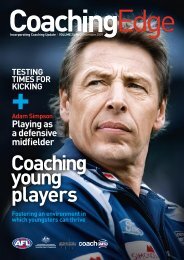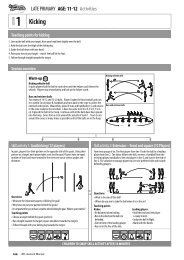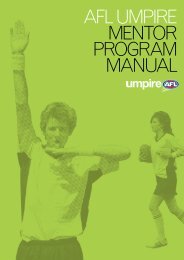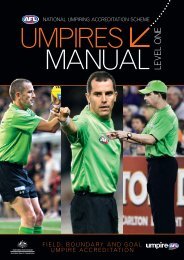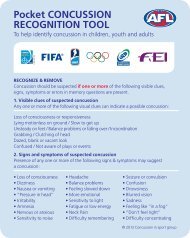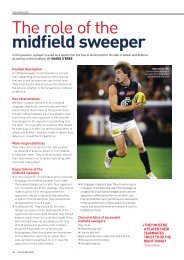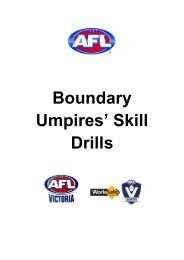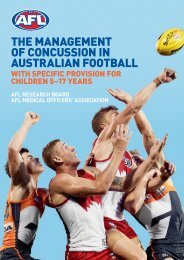AFL Coaching Manual - Western Bulldogs Football Club
AFL Coaching Manual - Western Bulldogs Football Club
AFL Coaching Manual - Western Bulldogs Football Club
You also want an ePaper? Increase the reach of your titles
YUMPU automatically turns print PDFs into web optimized ePapers that Google loves.
the coach<br />
chapter 1 – the role of the coach<br />
COACHING<br />
PRINCIPLES<br />
Fundamentals do apply to<br />
coaching, irrespective of<br />
the age group and level<br />
of competition.<br />
The coaching principles that follow<br />
should form the foundation of your<br />
coaching style.<br />
START WITH YOURSELF<br />
Be organised<br />
The good coach is well organised,<br />
is enthusiastic and establishes with<br />
his attitude the correct work ethic<br />
within the team. Training sessions<br />
and match-day arrangements are<br />
organised well in advance. The<br />
coach must be well presented,<br />
look the part and be in control<br />
at all times.<br />
Be yourself<br />
Don’t be over concerned by other<br />
coaches or parents. Remember it’s<br />
your team and you have the ultimate<br />
responsibility for their performance.<br />
Use assistants<br />
Surround yourself with competent<br />
people you can work with. Take time<br />
to appoint your assistant coach, team<br />
manager, runner and chairman of<br />
selectors. You must be comfortable<br />
with these appointments as you<br />
will often rely on their advice<br />
during the year.<br />
Ensure each has a clear job<br />
description outlining their role and<br />
responsibility. Communicate with<br />
your assistants regularly and listen to<br />
their opinions and suggestions.<br />
14<br />
And plan:<br />
1. Set ground rules<br />
Outline to your players your expectations on all aspects of training including:<br />
p p training days.<br />
p p dress required for training.<br />
p p start times.<br />
p p policy for late or non-arrival.<br />
A policy should also be adopted on recommended behaviour off the field.<br />
2. Develop club spirit<br />
Encourage togetherness both on and off the ground.<br />
It is important to promote a family club, therefore attendance at club functions<br />
can be beneficial in team building.<br />
Attempt to mix socially with all members of the football club.<br />
On the ground, highlight ‘team play’ efforts rather than individual efforts. A<br />
team-lifting effort such as a goal scored from a good passage of play should be<br />
strongly emphasised.<br />
3. Respect the individual<br />
A coach working with a large group of footballers must understand that each player is<br />
unique in terms of temperament and personality and will exhibit varying behaviour.<br />
Players must be treated as individuals. Ensure all players are recognised and<br />
treated equally.<br />
4. Junior club involvement<br />
The senior club coach must show a keen interest in junior teams and their training<br />
program. Junior club coaches should be consulted at the beginning of the year and<br />
at regular intervals during the season. Encourage similar coaching and training<br />
methods for all teams. The coach might look for opportunities to mentor younger or<br />
assistant coaches.<br />
5. Fundamentals<br />
The basic skills of football must be continually taught and practised. A coach must<br />
reinforce the basic possession and disposal skills. A team plan is of no value if<br />
players are unable to kick, mark, handball or perform other basic skills.<br />
6. Team-plan<br />
The coach must formulate a team-plan. This plan is comprised of:<br />
Basics – that is, specific rules for forwards, backs, rucks and midfielders.<br />
Tactics – these are the plays that vary from game to game depending on the<br />
weather, ground conditions, the opposition and the players at your disposal.<br />
Team rules – that is, specific rules that all players will adhere to all over the<br />
ground, e.g. protect the ball carrier.<br />
7. Player responsibility<br />
Encourage more experienced players to take on extra responsibilities at training<br />
and on match-day. Generate involvement and support for your role by seeking their<br />
opinion on opposition teams and your game-plan.<br />
JUNIOR COACH<br />
Code of<br />
Behaviour<br />
Be reasonable in your<br />
demands on players’ time,<br />
energy and enthusiasm. Avoid<br />
‘over-playing’ the talented<br />
players. Average players need<br />
and deserve equal time.<br />
Remember that children participate<br />
for fun and enjoyment.<br />
Ensure that equipment and<br />
facilities meet safety standards<br />
and are appropriate to the age<br />
and ability of the players.<br />
Develop team respect for the<br />
ability of opponents as well as<br />
the judgment of umpires.<br />
Follow the advice of a qualified<br />
sports trainer when determining<br />
when an injured player is ready to<br />
resume training or competition.<br />
Keep yourself informed and<br />
updated on sound coaching<br />
principles.<br />
Create opportunities to teach<br />
sportsmanship as well as the skills<br />
of the game.<br />
Ensure your players understand<br />
their responsibilities and the need<br />
to participate according to the rules.<br />
Demonstrate appropriate<br />
behaviour in your conduct both<br />
on and off the ground.<br />
8. Communication<br />
The well-prepared coach provides continual feedback to the team and individuals<br />
within the team.<br />
All players need feedback. The coach must avoid the tendency to talk to<br />
the better players and ignore low achievers.<br />
Good communication is the essence of successful coaching. The coach<br />
must be able to deliver a message and at the same time listen to players.<br />
9. Player discipline<br />
Problems will occur during the course of a football year. Whether it be a<br />
late arrival for a vital game or disregard for club property, it is advisable to be<br />
well prepared.<br />
A set of guidelines must be established early in the season to deal with a<br />
player breaching the rules.<br />
It is preferable to allow player input into the rules, making them ‘the team’s<br />
rules’ rather than simply dictated by the coach.<br />
If an infringement does occur, listen to the player’s explanation, explain that<br />
team rules have been broken and take action immediately.<br />
This procedure should be firmly implemented.<br />
10. Know and care for the game<br />
The serious coach will have a genuine love for the game of football.<br />
The successful coach will be a student of the game striving to learn from other<br />
coaches, relevant football texts and videos as well as coach education courses.<br />
Experience teaches us how to improve. If approached openly and<br />
enthusiastically, coaching as a profession offers great fulfilment and<br />
personal satisfaction.<br />
11. Planning<br />
Planning is the key to successful coaching. A yearly plan is essential for coaches if<br />
they wish to optimise the development of their players. The coach must evaluate<br />
the team’s current standing and plan the coaching year, and individual sessions,<br />
to achieve optimal benefit.<br />
12. Safety<br />
It is the responsibility of the coach to provide an environment that does not<br />
expose the footballer to potential injury.<br />
To be effective in this area, the coach must be aware of appropriate warm-up<br />
activities, protective equipment, the importance of fluid replacement, adequate<br />
dietary intake, rest and recovery, as well as safe playing and training facilities.<br />
13. Goal setting<br />
Goals may be set by the coach and players together for individuals and the team.<br />
These must be realistic, flexible and achievable.<br />
Team and individual goals should be assessed regularly.<br />
HOW DO YOU WANT TO BE REMEMBERED AS A COACH?<br />
15



